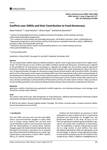Conflicts over GMOs and their Contribution to Food Democracy
Abstract
The use of genetically modified organisms (GMOs) embodies a specific vision of agricultural systems that is highly controversial. The article focuses on how conflicts over GMOs contribute towards food democracy. Food democracy is defined as the possibility for all social groups to participate in, negotiate and struggle over how societies organize agricultural production, thereby ensuring that food systems fulfil the needs of people and sustain (re)productive nature into the future. EU agricultural policy envisages the coexistence of agricultural and food systems with and without GMOs. This policy, which on the surface appears to be a means of avoiding conflict, has in fact exacerbated conflict, while creating obstacles to the development of food democracy. By contrast, empirical analysis of movements against GMOs in Germany and Poland shows how they create pathways towards participation in the food system and the creation of alternative agricultural futures, thereby contributing to a democratization of food systems and thus of society-nature relations. Today, as products of new breeding techniques such as genome editing are being released, these movements are gaining new relevance.
